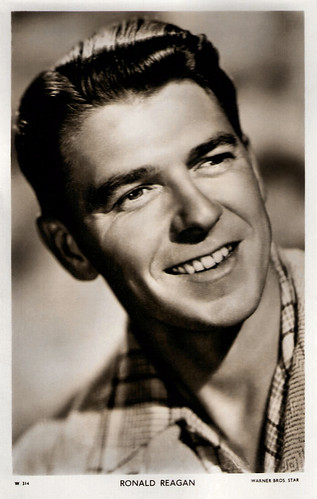
British postcard in the Picturegoer Series, London, no. W. 314. Photo: Warner Bros.
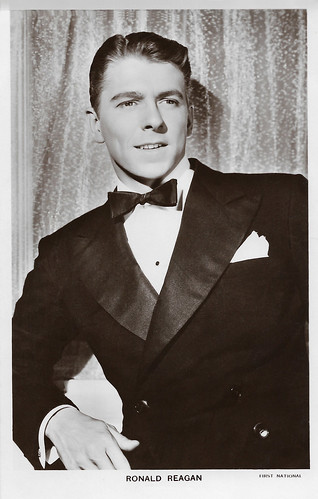
British postcard in the Picturegoer Series, London, no. 1295. Photo: First National.
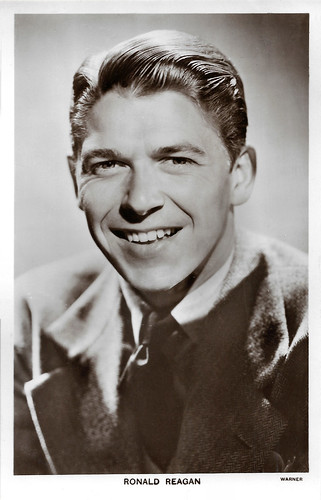
British postcard in the Picturegoer Series, London, no. 1295a. Photo: Warner.
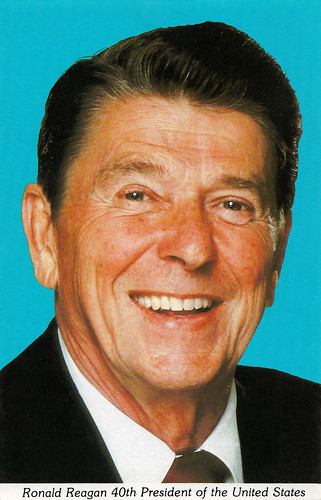
American postcard by Capsco, Inc, Washington, D.C., no. P321509. Photo: Courtesy of the President-Elect Office. Caption: Ronald Reagan, 40th President of the United States.
Where's the rest of me?
Ronald Wilson Reagan was the son of the shoe salesman and storyteller Jack Reagan and Nelle Clyde Wilson Reagan. He was born in 1911 in Tampico, Illinois, but grew up in Dixon. His first job was as a lifeguard at the Rock River in Lowell Park, near Dixon, in 1927. He rescued 77 people in this position. He was then educated at Eureka College, where he earned a degree in economics and sociology. He excelled in politics, sports and theatre, and was a member of the football team and captain of the swimming team. During his studies, Reagan led a student revolt against the president of the college.
After college, Reagan began his career at a regional radio station as a sportscaster. When he accompanied the Chicago Cubs on a trip to California as a reporter, he came to Hollywood for an audition. The film company Warner Bros offered him a seven-year acting contract in 1937. Reagan spent the next few years in Hollywood as an actor in B-movies.
Although his roles were often overshadowed by those of others, he received good reviews for his acting. Reagan's first major role was the lead in the film Love is on the Air (Nick Grinde, 1937). In 1938, Reagan acted alongside actress Jane Wyman in the film Brother Rat (William Keighley, 1938). They married in 1940. By then, he had appeared in 19 films, including Dark Victory (Edmund Goulding, 1939) starring Bette Davis.
Reagan often embodied elegant and respectable personalities with firm morals and principles such as the role of George "The Gipper" Gipp in Knute Rockne, All American (Lloyd Bacon, 1940) with Pat O'Brien. This film later earned him the nickname "The Gipper". In 1941, he was voted the fifth most popular actor of the new generation in Hollywood.
Reagan's favourite role was in Kings Row (Sam Wood, 1942) with Ann Sheridan. He played a man who had been doubly amputated and who uttered the words 'Where's the rest of me?' He later used these words as the title of his autobiography, which came out in 1965. Although the film was scratched by Bosley Crowther, the New York Times critic at the time, many critics today consider Kings Row to be one of Reagan's best films. The film was nominated for three Oscars.
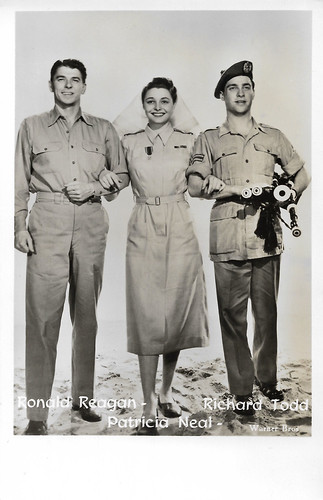
Belgian postcard by Nieuwe Merksemsche Chocolaterie S.P.R.L., Merksem (Anvers), No. D 13. Photo: Warner Bros. Ronald Reagan, Patricia Neal and Richard Todd in The Hasty Heart (Vincent Sherman, 1949).

Vintage postcard. Photo: Warner Bros. Virginia Mayo and Ronald Reagan in The Girl From Jones Beach (Peter Godfrey, 1949).
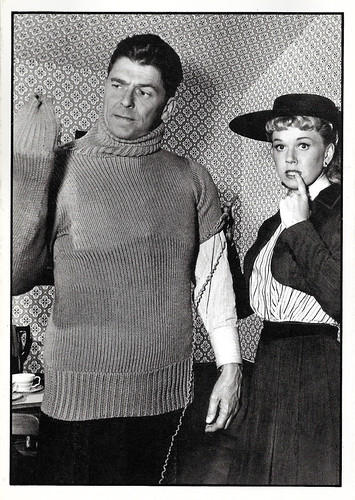
French postcard in the Entr'acte series by Éditions Asphodèle, Mâcon, no. 001/26. Ronald Reagan and Doris Day on the set of The Winning Team (Lewis Seiler, 1952). Caption: Ronald Reagan and Doris Day relax in their own way.
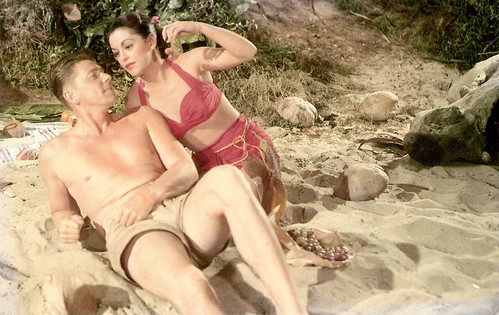
Belgian postcard. Ronald Reagan and Estelita Rodriguez in Tropic Zone (Lewis R. Foster, 1953). Collection: Geoffrey Donaldson Institute.

American postcard by Coral-Lee, Rancho Cordova, CA, no. SC17489. Photo: Tony Koroda / 1981 Sygma. Ronald Reagan and Barbara Stanwyck in Cattle Queen of Montana (Allan Dwan, 1954).
A poor man's James Stewart
Although Ronald Reagan called Kings Row the film that made him a star, he was unable to capitalise on its success. He was called into active service with the US Army in San Francisco two months after the film's release and would never regain star status in films in the future. He served nearly four years with the World War II stateside service in the first Motion Picture Unit.
In the post-war period, he resumed his film career with The Voice of the Turtle (Irving Rapper, 1947), John loves Mary (David Butler, 1949), and The Hasty Heart (Vincent Sherman, 1949) with Patricia Neal. He earned a reputation as a "poor man's James Stewart" in the early 1950s with starring roles in several small Westerns such as The Last Outpost (Lewis R. Foster, 1951), Law and Order (Nathan Juran, 1953), and Cattle Queen of Montana (Allan Dwan, 1954) with Barbara Stanwyck.
He also worked regularly as a voice actor and narrator for films, such as the Oscar-winning short Beyond the Line of Duty. From the 1950s, Reagan was also a regular on increasingly popular television. He appeared from 1954 to 1962 as a host in 260 episodes of the weekly anthology Western series General Electric Theater, named after the electrical corporation General Electric. His last film was the remake of The Killers (Don Siegel, 1964).
From 1947 to 1952 and from 1959 to 1960 he was president of the Screen Actors Guild (SAG), which is seen as the beginning of his political involvement. In the late 1940s, he was an informant for the FBI and named fellow actors whom he assigned to a group with communist ideas. After his career as an actor, Reagan went into politics. As a member of the Republican Party, he was the 33rd Governor of California from 1967 to 1975, before becoming the 40th President of the United States, succeeding Democrat Jimmy Carter, and ruling the country for two terms in office from 1981 to 1989.
Reagan's first term as president was mainly characterised by a supply-side economic policy, later called Reaganomics, with an emphasis on tax cuts to stimulate economic growth, restrictions on the supply of money to reduce inflation, deregulation of the economy, a reduction in government spending and a limitation of the power of trade unions. He was re-elected president in 1984. His second term was dominated by foreign events, such as the end of the Cold War, his bombing of Libya in 1986 and the exposure of the Iran-Contra affair, which damaged his government's image: it turned out that arms had been secretly supplied to Iran, the proceeds of which had financed rebels in Nicaragua.
Reagan publicly described the Soviet Union as "the empire of evil" and supported anti-communist movements worldwide. At the same time, however, Reagan sought a diplomatic way out of the arms race between the US and the Soviet Union, resulting in the conclusion of the INF Treaty in which both countries agreed to destroy a large number of (nuclear) missiles.
After Reagan stepped down as president in 1989, he and his wife moved into a house in Bel Air, Los Angeles; in addition, the couple owned the Reagan Ranch in Santa Barbara. Reagan died of pneumonia, partly caused by his poor condition due to Alzheimer's disease, at his home in Bel Air, Los Angeles, in 2004. He was 93. Ronald Reagan was the first and, until the election of Donald Trump in 2016, the only US president to be divorced.
After a dispute over Reagan's political aspirations, his first wife, Jane Wyman filed for divorce in 1948, citing Reagan's activities for the Screen Actors Guild as the reason for the irreconcilable distance. The couple had two children, Maureen (1941-2001) and Christine (1947, died after one day) and adopted a third child, Michael (1945). In 1949, Reagan met actress Nancy Davis, after she approached him in his capacity as president of the Screen Actors Guild to help her with matters concerning her appearance on the Hollywood blacklist (on the list she had been mistaken for another Nancy Davis). They married in 1952 and had two children, Patti (1952) and Ron Jr. (1958).
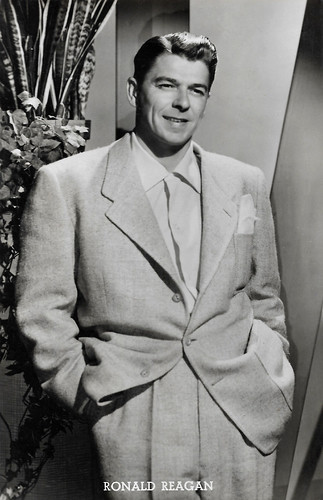
Belgian postcard, no. 551. Photo: Warner Bros.
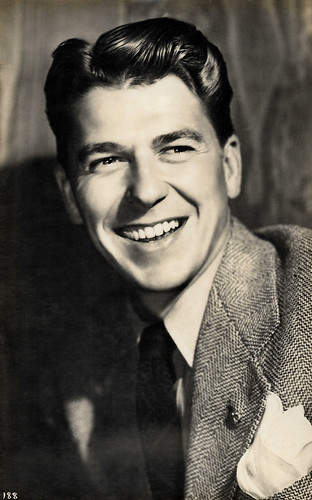
Spanish postcard by SOBE, Barcelona, no. 220.
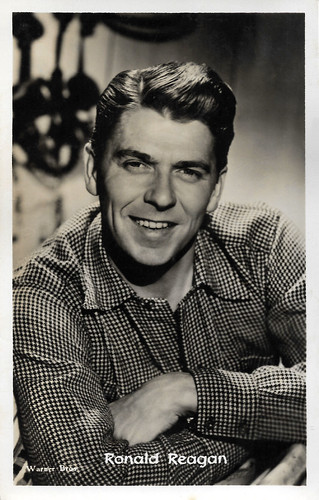
Vintage postcard. Photo: Warner Bros.

American autograph card.
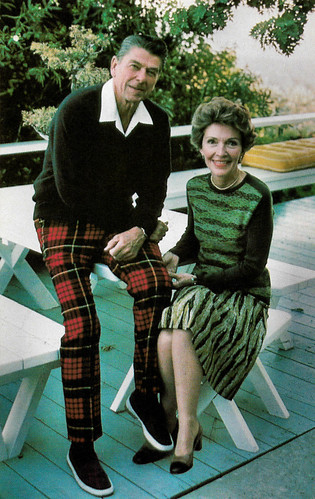
American postcard by Coral-Lee, Rancho Cordova, CA, no. SC17421. Photo: Michael Evans / 1980 Contact. Caption: Presidential candidate Ronald Reagan and wife Nancy on the deck of their home in Pacific Palisades, California.
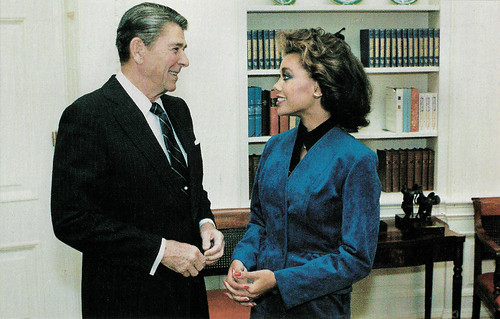
American postcard by Coral-Lee, Rancho Cordova, CA, no. CL-R.R. # 129 / SC18581. Photo: Bill Fitz-Patrick. Caption: The New Miss America, Vanessa Williams, had a brief meeting with President Reagan at the White House and they spent their time discussing how one keeps in shape on a busy, busy schedule. Williams said her meeting with the President was the most memorable moment of her reign so far. The White House state dinner she attended shortly after winning her crown was her second most memorable event. October 17, 1983.
Sources: Wikipedia (Dutch and German), and IMDb.
Ronald Reagan he is the best actor and former president of the United States of America (1981-89).🇺🇸⭐🌈🎭🏛
ReplyDeleteRonald Reagan he is my hero!!!!!!🇺🇸🇺🇸🇺🇸🇺🇸🇺🇸🇺🇸🇺🇸🇺🇸🇺🇸⭐⭐⭐⭐⭐⭐⭐😎😎😎😎😎😎😎😎😎😎😎😎🤓🤓🤓🤓🤓🤓🤓🤓😇😇😇😇😇😇😇😇🙏🙏🙏🙏🙏🙏🙏🙏🙏👼👼👼👼👼👼👼👼👼👼👼👼👼👼👼👼👼👼👼
ReplyDeleteRonald Reagan Hollywood actor and radio & TV host.⭐📻📺📽🎬🎥📹🎭
ReplyDeleteRonald Reagan Forever!!!!!😇🙏👼🎭🇺🇸😎🤓🏛⭐🌈📻📺📽🎬🎥📹
ReplyDelete